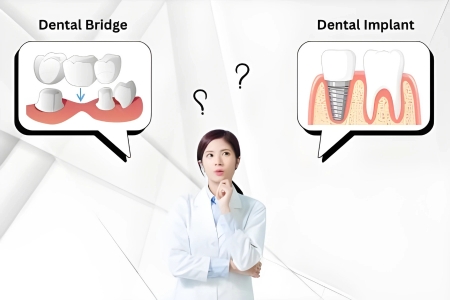Modern dentistry offers more than one way to replace a missing tooth.
Dental bridges and implants each bring unique benefits and trade-offs, and the best choice often depends on your lifestyle, budget, and oral health goals.
This article gives you a comprehensive overview of the benefits and risks of both implants and bridges.
What are dental bridges?
A dental bridge is a fixed prosthetic solution where the replacement tooth is supported by the adjacent teeth, each fitted with crowns for stability.
Bridges restore chewing function and aesthetics, and they are often chosen when patients want a faster replacement option without undergoing surgery.
What are dental implants?
A dental implant is a small titanium post that is surgically placed into the jawbone to act as an artificial tooth root.
Once the bone has fully bonded with the implant, a crown is fixed on top, offering stability and a lifelike appearance.
Known for their durability and strength, implants are considered the closest match to natural teeth and are often recommended for patients looking for a long-term solution.
Procedure Timeline: How Quickly Do You Need a Replacement?
Time is often a deciding factor.
A dental bridge usually takes only two to three dental visits to complete, making it a quicker solution for those who want their smile restored promptly.
Implants, on the other hand, require a longer process.
After the implant placement, the bone needs several months to heal and fuse with the post before the crown can be attached.
While this timeline is longer, the result is a restoration that feels almost identical to a natural tooth.
Durability & Lifespan: What Lasts Longer?
Bridges generally last about 10–15 years with good care.
However, the supporting teeth can sometimes weaken over time, leading to replacement sooner than expected.
Implants are known for their longevity.
With good oral care and regular dental visits, they often last 20 years or longer, and in many cases, can serve you for life.
This is one of the reasons why many patients consider implants an investment in long-term oral health.
Cost Comparison in Calgary (2025)
Tooth replacement costs can differ based on the procedure, choice of materials, and the clinic’s region.
In Calgary, dental bridges are usually less expensive initially, as they do not involve surgery.
However, because they may require replacement after a decade or so, the long-term expense can add up.
Implants come with a higher upfront cost, but their durability often makes them more cost-effective in the long run.
Patients seeking the best dental implants may also consider that they require fewer replacements and protect overall oral health, which can save on future treatments.
Bone & Gum Health: What About Long-Term Oral Support?
A key difference between the two options lies in how they affect the jawbone.
Implants support bone health by providing stimulation similar to natural roots, reducing the risk of bone loss.
They also support gum tissue health and help maintain facial structure.
Bridges, while effective for restoring chewing function and appearance, do not provide this same stimulation.
Bone loss beneath the missing tooth can gradually change the bridge’s appearance and fit.
Impact on Nearby Teeth: Do You Want to Protect Healthy Teeth?
To place a bridge, the teeth on either side of the gap must be filed down so crowns can be placed.
While this ensures stability, it does mean altering otherwise healthy teeth.
Implants, by contrast, stand independently without relying on surrounding teeth for support.
This makes them a preferred option for patients who want to preserve the natural integrity of their neighboring teeth.
Aesthetics & Comfort: What Looks and Feels Most Natural?
Both options can be customized to closely resemble your surrounding teeth in shade and form. However, implants often look and feel the most natural because they emerge directly from the gumline, just like a real tooth.
Many patients find that implants let them eat, talk, and smile comfortably, without the minor adjustments that bridges may occasionally need.
Risk Factors to Consider Before You Decide
Dental Bridges
Require support from neighboring teeth, which need to be filed down and crowned.
If the supporting teeth are weak, decayed, or already heavily filled, they may not hold the bridge well over time.
Do not prevent bone loss beneath the missing tooth, which can affect long-term fit and appearance.
Bridges may need replacement every 10–15 years, adding to long-term maintenance.
Dental Implants
Require sufficient bone density for placement; bone grafting may be necessary in some cases.
Healing can take several months, requiring patience and follow-up visits.
Higher risk of complications in smokers or patients with uncontrolled diabetes.
Higher upfront cost compared to bridges.
Which Tooth Replacement Option Is Right for You?
The decision between a bridge and an implant comes down to your health, budget, and long-term goals.
If you want a quicker, non-surgical solution and are comfortable with altering nearby teeth, a bridge may serve you well. If you are seeking the most durable, natural, and bone-friendly option, implants are often considered the gold standard.
If you are considering getting either a bridge or an implant to fix your missing tooth, reach out to us at Heritage Pointe Dental.
Our team will walk you through the advantages and drawbacks of each option and help you choose the one that fits your needs.
FAQs
How long does the procedure take?
Bridges are typically completed in a few weeks. Implants may take several months due to healing time.
Are implants painful?
The placement is done under local anesthesia, and most patients report only mild discomfort afterward.
Which option looks better?
Both look natural, but implants tend to mimic the look and feel of a natural tooth more closely.
Is one option safer than the other?
Both are safe when performed by a qualified dentist. The choice depends on your health, bone density, and treatment goals.

